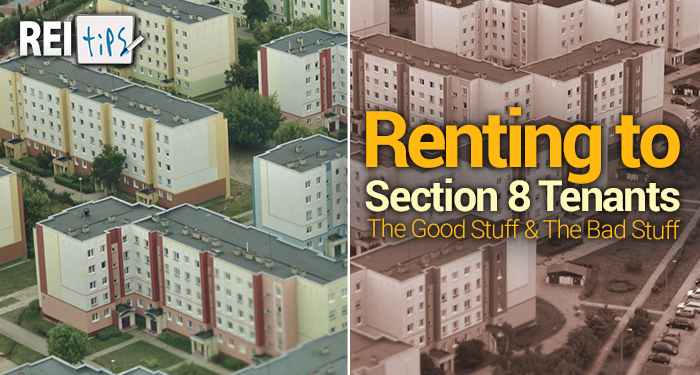The good news is this – for some investors, renting to Section 8 tenants can be an awesome opportunity. Depending on your market and the types of homes you purchase, Section 8 can offer some distinct advantages over renting to private tenants.
The key is – you need to do your due diligence when determining if this is the right opportunity for you.
The process of becoming a Section 8 landlord is fairly straightforward. You start by filling out an application with your local Public Housing Authority (do a quick Google search using your county name and “Public Housing Authority” to find the right one).
Once the paperwork is complete and you’re approved as a Section 8 landlord, the process for finding and screening tenants is pretty much the same as finding any tenant. You’ll still want to do a background check on possible tenants, create a lease and make sure you’re policing your rental property on a regular basis.
With that being said, there are some definite advantages and disadvantages of renting to Section 8 tenants. I want to cover those in more detail, so you can make an informed decision about whether or not this is the right choice for you.
And, of course, don’t take my word for it – do your own research before you make the final decision.
The Good Stuff #1: Steady Income
There are obviously quite a few benefits to renting to Section 8 tenants… otherwise, no one would do it.
Let’s address the glaringly obvious one first (and the reason many property owners decide to take this route when it comes to renting out their homes)… guaranteed rent payments, baby!
First – a little background on this…
When people become eligible for Section 8 benefits, they receive housing vouchers from the government. After they find a place to live and sign the lease, the Public Housing Authority pays the tenant’s housing voucher directly to the landlord.
This can be done in one of two ways:
 By sending you a check
By sending you a check By depositing the funds directly into your account
By depositing the funds directly into your account
After the first monthly payment, however, it should be a breeze from there. You will receive your payments in a timely manner from the government. Cha-ching!
Also, I would be remiss if I didn’t mention the fact that many Section 8 tenants don’t have their entire housing cost covered by the government. Some of them will need to pay a small portion of the rent out of their own pocket.
If they don’t pay their portion, they risk losing their monthly housing voucher. And, as those of us with rudimentary math skills can tell you: paying a small portion of the rent is much more desirable than paying all of the rent – so these individuals and families are highly motivated to pay their rent on time, every month.
On the other hand, if you’re renting to private tenants, there’s always a chance that they may fail to make their rent payments (even if you’ve conducted an excellent background check, this could still happen).
Check out this true story…
I heard of an investor who “inherited” a private tenant when he bought a property, and then had a terrible time getting the guy to pay his rent. When the investor finally took the delinquent tenant to court, the tenant claimed that he was the rightful owner of the property, and that the investor was a scam artist who was just trying to get him thrown out of his house. (Whaaat?!)
Obviously, this was an extreme case. But the bad part was that the judge gave this bozo tenant a chance to prove himself, and the case turned into a tedious and time-wasting process that left the investor drained of emotional energy.
The morale of the story: Tenants from hell can come from anywhere, but with Section 8 tenants, you are at least guaranteed to receive your monthly rent payment. Boom!
The Good Stuff #2: No Shortage of Tenants
Another advantage of renting to Section 8 tenants is that you will probably NEVER have trouble finding people to live in your properties.
In many areas of the country, there are waiting lists of individuals and families who are hoping to qualify for the Section 8 program; that’s how popular and widely used it is.
Plus, when you decide to open your properties up to Section 8 tenants, you’ll have a whole new pool of candidates to choose from.
The U.S. Department of Housing and Urban Development website also allows Section 8 landlords to advertise their properties (for free), which means you’ll need to do basically ZERO work at ZERO cost to find potential tenants.
Overall, Section 8 is a great resource for property owners who may be struggling to find traditional, private tenants.
The Good Stuff #3: Pre-Screened Tenants
Now, as I mentioned before, if you decide to go with Section 8 tenants, you’ll still want to conduct your own background check (and possibly a credit check too). BUT, the nice part is: The Public Housing Authority does its own screening of potential tenants – which helps narrow down the candidate pool before you even have to do any work.
For instance, the Public Housing Authority checks out criminal histories, and will not provide vouchers to people who have a been evicted for drug-related offenses in the past 3 years. The government will also provide you with a list of the tenant’s current and past landlords (names and addresses), so you can easily do your due diligence.
Just make sure you’re covering all your bases when it comes to screening tenants for your Section 8 properties. But it’s good to know that some of the initial work has already been done in that area.
Now that I’ve painted a pretty picture of the benefits of renting to Section 8 tenants, I want to make sure you’re aware of the cons.
The Bad Stuff #1: Property Inspections
This may or may not be a “con” in your mind. Just know that the Public Housing Authority will perform an initial inspection of your property, should you decide to apply as a Section 8 property owner.
The inspection will ensure that the property meets HUD’s housing quality standards for safety, water, electrical, etc.
The bad news?
You may be given a list of items to repair or upgrade. It could be as basic as installing new smoke detectors, but it could also be as complex as rewiring electrical.
After the initial inspection, you will also be required to submit to a yearly inspection by the Public Housing Authority.
All in all, this is just something that you should consider when deciding whether or not you want to accept Section 8 tenants. Make sure you have the time and funds to accommodate these inspections and their possible repair requirements.
The Bad Stuff #2: Financial Considerations
Just as there is a financial upside to Section 8 (guaranteed rent payments), there can also be some financial downsides that you should consider.
First, the government doesn’t require tenants to pay a security deposit for Section 8 properties. On the flipside, you can still require a security deposit – but you will have to get it directly from the tenant. This could be an issue, especially if tenants are willing to go elsewhere and live in a Section 8 home that does not require a security deposit.
Even more importantly, HUD will also determine a “Fair Market Rent,” based on the location of your property, its condition and the number of bedrooms/bathrooms. Based on how they evaluate your property, you could end up with less monthly rental income than if you were to rent to non-Section 8 tenants.
Again, in some cases, these financial factors may be a non-issue…
Maybe you will have no problem getting a security deposit from your tenants. Maybe the government will charge a fair (or even-better-than-you-expected) rent price for your property. And that’s awesome.
The Bad Stuff #3: Stereotypes & Stigmas
One final factor to think about – when considering whether to rent to Section 8 tenants – is the stigma and stereotypes associated with subsidized housing.
Section 8 tenants are sometimes portrayed as individuals who will neglect or even destroy your property, because they have no ownership or reason to respect it.
But let me say this: ANY tenant can do this. This is not unique to Section 8 tenants!
I’ve heard horror stories about investors who take on Section 8 tenants but – on the other hand – I’ve also talked with investors who say that their Section 8 tenants are the most respectful, courteous and grateful people they’ve ever met.
It all comes down to this…
If you do your due diligence and properly screen potential tenants, you will greatly reduce the risk of your property being damaged by their negligence. A person’s inner character has nothing to do with income level or status in society.
One final thought to consider as well: Even if you are A-okay with renting to Section 8 tenants, there may be others who are not as enthusiastic about it. For instance, if you own a multi-unit property, and you rent to some Section 8 tenants, you may encounter some difficulty in renting the other units to non-Section 8 tenants.
Again, these may not be deal-breakers for you. Maybe you’re shaking your head right now and saying, “Nope, this would never be an issue for me.” But I say it’s simply something to mull over before you make the decision to pursue Section 8 tenants.
Bringing it Home
Pulling all of these ideas together, you should be able to develop a clear picture of whether or not Section 8 is the right choice for you.
If your target market is low- to middle-income tenants, this could be an amazing opportunity. But if you’re investing in luxury properties in affluent areas, obviously this is not for you.
Also, carefully consider the amount of time this process requires. You need to have the availability to accommodate inspections, make necessary repairs and more. If you’re a brand-new investor who is just starting out (and you don’t have an assistant or a team of people to help you), the time needed to focus on Section 8 responsibilities might be too great.
Once you get into the groove of Section 8, it can basically be an effortless process. It’s all up to you to decide if this is right for your market, your property and your skillset.
Ups and Downs
What’s been your experience with Section 8? What techniques do you use to ensure that you get the best tenants? Every situation is unique, but I find it super helpful to hear stories from other investors. Let me know your thoughts in the comments section below.




